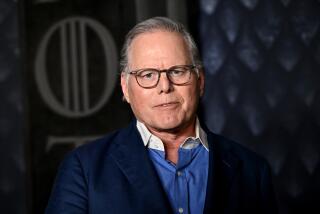SEC Extends Audit of Troubled Cannon : Movie Company, Facing ‘Substantial’ ‘86 Loss, Will Sell Film Library
Independent movie maker Cannon Group disclosed Thursday that it expects to show “substantial” losses for its fiscal year ended Jan. 3. The Los Angeles-based firm also said that a special audit of its books--undertaken last fall under pressure of a federal securities investigation--now will cover the full year, rather than the originally envisioned nine-month period that ended Sept. 27.
Separately, the troubled Los Angeles firm got a promise of financial relief of at least $125 million in the form of an agreement to sell the 2,000-title film library owned by its recently acquired British unit, Screen Entertainment Ltd. (formerly Thorn-EMI). The buyer is Weintraub Entertainment Group, a Los Angeles company recently established by movie producer Jerry Weintraub.
In a related matter, public documents show that a previously reported cut in Cannon’s movie production schedule was mandated by tough new restrictions imposed nearly three months ago by its lending banks.
Production Budget Ceiling
Those restrictions--including a $6-million budget ceiling on most of its pictures after last Dec. 19--are in a revised agreement with First National Bank of Boston, Bank of America, Wells Fargo Bank and Chemical Bank, dated Dec. 19.
That was followed several days later by an announcement of a deal with Warner Communications that brought Cannon $75 million and temporary relief from a financial crisis. Warner guaranteed a $50-million bank loan to Cannon as part of the complex deal.
The New York-based entertainment conglomerate agreed to pay Cannon $50 million for 23% of its common stock, plus an option to buy a 50% interest in Cannon’s 500 British, Dutch and Italian movie screens for another $50 million. Separately, Warner paid $25 million in cash for certain U. S. video-distribution rights on some Cannon films.
In one news release issued after the close of securities markets Thursday, Cannon’s directors announced that the 1986 audit being conducted by its new auditors, Arthur Young & Co., now will cover a full year. The decision was preceded by discussions between the Arthur Young firm and the Securities and Exchange Commission on the subject.
The company said that the audit, which was expected to be complete about this time, now “will be forthcoming” in mid- to late April, concurrent with the filing of the firm’s 10-K annual report with the SEC.
Besides substantial losses for 1986, the firm’s statements will show “significant downward adjustments in previously reported stockholders’ equity,” the release concluded.
As previously reported, substantial writedowns are expected because of the SEC’s investigation that began last summer into the way Cannon has accounted for its film costs in amortizing pictures. The firm said that the SEC later expanded its probe into the firm’s financial public disclosures since 1983.
In agreeing on the sale of Cannon’s Screen Entertainment library to Weintraub, the parties said the process will involve an appraisal in which the buyer is protected by establishment of a ceiling of $175 million and the seller is protected by a right not to sell if the valuation establishes a price of less than $125 million.
Cannon is to retain its own 800-picture library in this country.
Company Chairman Menahem Golan said the sale represents a “significant opportunity” to reduce the company’s debt and “create facilities for its continued production and distribution program.”
Restriction on Film Production
The amended agreement with its banks, filed with the SEC in late January, provides that Cannon “shall not have more than two items of product in principal photography at any one time.”
Further, it provided the $6-million ceiling on pictures with principal photography beginning after last Dec. 19, with an exception that the budget on two films could go above that figure but not more than $7.5 million.
Another amendment reduced Cannon’s allowable capital expenditures to a total of $7 million in 1987, from $30 million in 1986.
Cannon said Thursday that it will retain all other remaining assets from its original Screen Entertainment purchase, including more than 300 British movie screens (with 50% interest optioned to Warner), the Elstree film production studio in England, the video and distribution companies and a separate British distribution company in partnership with Warner and Columbia Pictures.
Chairman Jerry Weintraub of Weintraub Entertainment hailed the deal as providing “invaluable and irreplaceable building blocks for our future growth” as well as a major expansion of the firm’s diversified international activities.
More to Read
The biggest entertainment stories
Get our big stories about Hollywood, film, television, music, arts, culture and more right in your inbox as soon as they publish.
You may occasionally receive promotional content from the Los Angeles Times.










